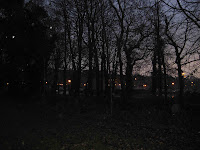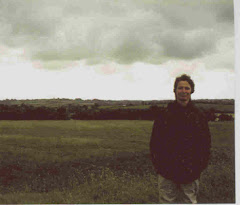
I had put it off too long. I had not done The Joyce Tour of Dublin. On the very last Saturday possible, I got up at 5:00 to start the long haul across the island. As I walked into town, it was still dark and the sun would not come up until 8:30. However, the street lights were very bright and birds were singing: thrushes and warblers -- in the dark! At 6:00 on a Saturday morning, the city was slowly waking up. Cabs and vans zoomed through the roundabouts at full tilt, which would not be possible in about 2 hours when the r

oundabouts would become parking lots. But at 6:30, people were out pulling the grills off the store fronts, and putting out the fruit. The "fresh" wind was making all the pedestrians very pink in the nose and cheeks. On the way to the cold train stations, people looked like snails, dragging their possessions along behind them and on the backs in large bags. My snail bag was full of books and a litre and half of water. Once I got onto the train, the sudden warmth after the chilly train station seemed to make the darkness feel even deeper.
Upon arriving in Dublin, I thought I would take the Luas (the new trolly system) because I had avoided it. It felt like the responsible explorer Thing to Do. So I dutifully bought my ticket, and jammed myself into the packed train. I mean it was packed like a sardines. Some clever young person, who I could not see as my entire field of vision was consumed by the waxed cotton jacket in front of me, kept up a running commentary of how she could not breathe, she was being crushed, and we were all going to die. When she and her crew got off a few stops later, the rest of the trolly's sardines breathed a collected sigh of relief.

So I hopped off at Abbey St. and headed up O'Connell street to see the James Joyce Center. It was just like the Jane Austen Center in Bath, except, of course, that it was about James Joyce. What I mean is the location and design were strikingly similar to the Jane Austen Center. It was a genteely decaying Georgian town house in a neighborhood that had seen better days about a hundred years ago. It was pretty cold outside, but the door was wide open in a freezing cold hundred thousand welcome sort of way. I paid my requisite four Euro to the young person who seemed to doubt I was a student but did not ask to see an ID. Just think what I could get away with if I used Oil of Olay...


There was a mural commemorating Ulysses painted on a wall. There was a cow with quotes by critics carved into it. If you click on the picture of text, you can read what they carved onto the cow's udder. There was also the 'original door' for the Bloom's house on Eccles street. How can you have an original door to a fictional house?
Upstairs where it was only slightly less freezing cold were some interactive computers and a video. The interactive computers told Joyce's biography and publication timelines and the video talked about why he was the greatest author of the 20th century. They also had his death mask! Even mor

e interesting than the mask itself was its story which was pasted on the corner of the wall near it where it told about the original mask, a mysterious pirated mask (!), and what happened to all the copies. Imagine! Priscilla and I went to see Rudoph Steiner's death mask, and that was just as creepy as this one. Here is a picture of the death mask with me as a ghost in the case with the mask.
Then I went down a floor and looked at all the books they had out on a big table. There were big coffee table books full of shiny pictures, and little critical books full of texty text. The best map book was this one:
James Joyce's Dublin: a topographical guide to the Dublin of Ulysses by Ian Gunn and Clive Hart, London: Thames and Hudson, 1975,1981,2004.
This book has great maps on where each character went and when. I copied a few down and set off to follow them.

I first went up to Eccles Street. Here is the 'new' door for the Bloom's house (the yellow one). Here is the street context.

Then I went and walked through what had been the prostitute's district where Stephen and Leopold went which is now government housing and China town. (You need to click on the picture to get the full Chinese effect.)

There was a motorcycle ralley of the Wexford Mortocycle club taking place outside a hospital in the area. On the street were a number of Triumphs, one BMW, and bunch of Hondas. The bikers were all decked in their cracked leather and jeans that were more grey than blue. It was unclear why they were gathered in front of the hospital. They did not look cheery. I wondered if maybe one of their members was in that institution for some reason and if this was a show of solidarity of some sort.

I walked back to O'Connell and was accosted by a person who might have been born in India (or Dublin, of course), who assured me of something I could not understand for which I thanked him. I hiked over to take a look at the Abbey and to get a little documentation in case I had to do a powerpoint presentation. There were a lot of Eastern European women sitting on the sidewalk outside the Abbey Acting school with paper cups out for change and stiffly bundled (apparently) sleeping babies on their knees. I put money in the cups, as Ralph has taught me to do, and I asked, "Do you have somewhere warm to stay tonight?" One woman looked blankly up at me and only said, "No." I walked on wondering what I could do with this information. Pathetically nothing, it appeared.
I marched across the street past Tara St. Station, avoiding the bone crush on the bridge of O'Connell street, and circled Trinity around Westland Rowe. There I found The International Aikido Center and Natural Healing Center down an alley. Who knew?

Emerging out into the shopping area of Nassau Street, I hit the crowds of supplicants to the Church of Mammon. Shoulder to shoulder it was, full of people dressed in black coats with pink faces and be-bagged by GAP, T.K. Maxx, and Penny's. The day was dark and damp, so that the canopy of lights over Grafton Street was all glowing. There were musicians every 20 feet, and I don't know how they kept their hands limber enough to play. The busker who drew the biggest crowd was a young man in a Texas broad brimmed hat, sitting on a stool, playing a dobro guitar as if it were a roaring campfire in the wilderness. He was that good.
I was beginning to go into Crowd Shock, so I elbowed my way out of the top of Grafton and went back through 'the labyrinth' to the Avoca Cafe. Should to shoulder it was, people in black coats and pink faces. On my way up to the cafe, I found a book entitled
How to Do Good Deeds
. I opened it randomly and read, "How to Hold a Baby on Your Lap: face baby outwards, hold your legs together, and grasp the baby around the middle." Right.
The cafe was full of people in black coats with faces slightly less pink than those on the street, so I went down to the basement to sit at the counter and have scones and coffee. After a long, cold, grey walk, the warmth, the pink and yellow walls, the food, and the drink were paradise. I wanted to live at that lunch counter. I knew that as soon as I finished my snack, the flaming sword of commerce would drive me back onto the street, so I made my snack last as long as possible. The lunch counter is under a glass block section of the sidewalk above. I watched the feet of shoppers passing overhead. There were a lot of women about my age, by themselves, eating the same snack as I was: coffee and scones. I felt part of a tribe.

So do I understand Ulysses or Dubliners any better? Did I feel closer to Joyce? As Don Benander wrote, a novel is not to be confused with a guidebook. I was reading Ulysses on the train on the way home. I have this feeling that the actual landscape is important, but I am still utterly at sea with Joyce. I read Ulysses, and intellectually I can understand its historical importance, but I am not
feeling
the greatness. I read
Dubliners
, and I want to shake Eveline into consciousness and push her onto that boat. I want to get the poor kid in "Araby" to just go join the Big Brother program. I want Gretta to just get over herself and Gabriel to just get on a bus and go to Tralee. It doesn't have to be Galway, fer crissake. I think the place is enhanced by the text, not the other way around. Or at least, I found it harder for Dublin to give Joyce meaning than for Joyce to give Dublin meaning.


 oundabouts would become parking lots. But at 6:30, people were out pulling the grills off the store fronts, and putting out the fruit. The "fresh" wind was making all the pedestrians very pink in the nose and cheeks. On the way to the cold train stations, people looked like snails, dragging their possessions along behind them and on the backs in large bags. My snail bag was full of books and a litre and half of water. Once I got onto the train, the sudden warmth after the chilly train station seemed to make the darkness feel even deeper.
oundabouts would become parking lots. But at 6:30, people were out pulling the grills off the store fronts, and putting out the fruit. The "fresh" wind was making all the pedestrians very pink in the nose and cheeks. On the way to the cold train stations, people looked like snails, dragging their possessions along behind them and on the backs in large bags. My snail bag was full of books and a litre and half of water. Once I got onto the train, the sudden warmth after the chilly train station seemed to make the darkness feel even deeper.

 There was a mural commemorating Ulysses painted on a wall. There was a cow with quotes by critics carved into it. If you click on the picture of text, you can read what they carved onto the cow's udder. There was also the 'original door' for the Bloom's house on Eccles street. How can you have an original door to a fictional house?
There was a mural commemorating Ulysses painted on a wall. There was a cow with quotes by critics carved into it. If you click on the picture of text, you can read what they carved onto the cow's udder. There was also the 'original door' for the Bloom's house on Eccles street. How can you have an original door to a fictional house? e interesting than the mask itself was its story which was pasted on the corner of the wall near it where it told about the original mask, a mysterious pirated mask (!), and what happened to all the copies. Imagine! Priscilla and I went to see Rudoph Steiner's death mask, and that was just as creepy as this one. Here is a picture of the death mask with me as a ghost in the case with the mask.
e interesting than the mask itself was its story which was pasted on the corner of the wall near it where it told about the original mask, a mysterious pirated mask (!), and what happened to all the copies. Imagine! Priscilla and I went to see Rudoph Steiner's death mask, and that was just as creepy as this one. Here is a picture of the death mask with me as a ghost in the case with the mask.




















